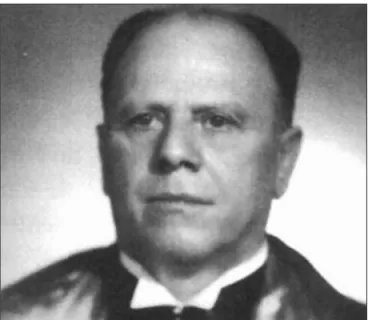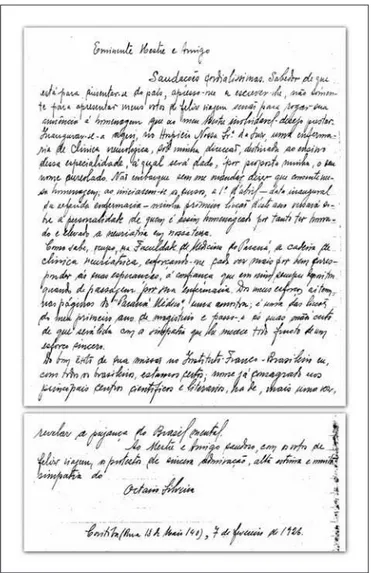Arq Neuropsiquiatr 2008;66(3-A):584-586
584
PROFESSOR OCTÁVIO DA SILVEIRA
The pioneer of neurology in the State of Paraná
Hélio A.G. Teive
1Abstract – The author gives a brief overview of the career of Professor Octávio da Silveira, the first neurologist and professor of neurology in the State of Paraná, as well as the first full professor of clinical neurology in the Federal University of Paraná.
KEY WORDS: Professor Octávio da Silveira, neurology, neuriatry, Paraná, Brazil, Federal University of Paraná.
Professor Octávio da Silveira: o pioneiro da neurologia no Estado do Paraná
Resumo – O autor apresenta de forma resumida os dados históricos que definem o professor Octávio da Silveira como o primeiro neurologista e professor de neurologia do Estado do Paraná, além do título de primeiro professor catedrático da clínica neurológica da Universidade Federal do Paraná.
PALAVRAS-CHAVE: Professor Octávio da Silveira, neurologia, neuriatria, Paraná, Brasil, Universidade Federal do Paraná.
Neurology Service, Department of Internal Medicine, Hospital de Clínicas, Federal University of Paraná, Curitiba, PR, Brazil: 1Associate Professor of
Neurology.
Received 6 February 2008, received in inal form 29 April 2008. Accepted 26 May 2008.
Dr. Hélio A.G. Teive – Rua General Carneiro 1103/102 - 80060-150 Curitiba PR - Brasil. E-mail: hagteive@mps.com.br
Brazilian neurology at its beginnings was strongly inlu-enced by the French school of neurology, of which the irst professor was Jean-Martin Charcot, now acknowledged to have been the founder of the French school of neurology1-3.
The irst school of neurology in Brazil was founded by Professor Antonio Austregésilo, who, in 1912, was the irst professor of neurology at the Faculty of Medicine of Rio de Janeiro, later called the National Faculty of Medicine of Rio de Janeiro and now known as the Federal Universi-ty of Rio de Janeiro2,4..
The São Paulo school of neurology originated in 1925, when Professor Enjolras Vampré was appointed to coordi-nate the Neurology and Psychiatry Clinic of the São Paulo Faculty of Medicine and Surgery, which later became the Faculty of Medicine of the University of São Paulo2,5.
Both Professor Austregésilo and Professor Vampré were greatly inluenced by the French school of neurolo-gy and also trained in neuroloneurolo-gy services in Paris, France, mainly under disciples of Professor J-M Charcot2-5.
The Paraná school of neurology originated in 1924, when professor Octávio da Silveira was chosen to coor-dinate the discipline of neurology in the Faculty of Med-icine of the University of Paraná, which was later to be-come the Federal University of Paraná6 .
ThE START OF nEuROLOgy In ThE STATE OF PARAnÁ
The history of neurology in the State of Paraná is inti-mately related to the history of the University of Paraná, established in 1912 and considered one of the oldest uni-versities in Brazil, and its Faculty of Medicine, set up in 1914. The Faculty of Medicine of the University of Paraná, only received oficial recognition on February 18, 1922, when it was approved by Professors Aloísio de Castro, Paulo de Frontin and Afonso Celso. The irst coordinators in the Faculty of Medicine were Professors Victor Ferreira do Amaral (director) and Nilo Cairo da Silva (secretary).6
The irst neurologist and professor of neuriatry (as the discipline was then called, when it combined both neu-rology and psychiatry) was Professor Octávio da Silveira, who was responsible for the discipline between 1920 and 1923. In 1924 the discipline was divided into neurology and psychiatry, and Professor Octávio de Silveira was respon-sible for coordinating the former discipline from 1924 un-til his honorable retirement in 19666.
PROFESSOR OCTÁVIO DA SILVEIRA
Arq Neuropsiquiatr 2008;66(3-A)
585
Octávio da Silveira Teive
Medicine in 1915 at the age of 21, when he defended his the-sis “On Presenile Melancholia” (Fig 2) which passed with an “Award of Honor” (Personal communication, Silveira OA)6.
After completing medical school, Professor Octávio da Silveira worked in clinical practice in different cities in the State of Rio Grande do Sul and then moved to Porto União, in the State of Santa Catarina.
After two years in clinical practice in Porto União, he relocated to the city of Curitiba, in the State of Paraná, and was subsequently invited to coordinate the discipline of neuriatry in the Paraná Faculty of Medicine in 19206.
In 1921 Professor Octávio da Silveira trained for 18 months in Professor Antônio Austregésilo’s neurology ser-vice in the city of Rio de Janeiro. There can be no doubt that this was a watershed in his career and that Professor Antônio Austregésilo had a long-lasting and marked inlu-ence on him, as can be seen in the letter he sent to the re-nowned professor in 1926 (Fig 3). 6
After returning to Curitiba, Professor Octávio da Sil-veira was responsible for the disciplines of neuriatry (be-tween 1920 and 1923) and neurology (from 1924 to 1966) and also coordinated the discipline of psychiatry for a number of years (between 1927 and 1931)6.
Because of his extensive knowledge of medicine, he was invited to substitute lecturers in different disciplines in the Faculty of Medicine and held posts in the disci-plines of introductory clinical medicine, medicinal chem-istry and medical pathology. He also taught the follow-ing disciplines: general zoology and animal parasitology; general biology and physiology; and organic and biologi-cal chemistry on the pharmacy course. (Personal commu-nication, Silveira OA).
In 1926 in the Psychiatric Hospital of Nossa Senhora da Luz, of which he was director, Professor Octávio da
Silvei-ra organized the irst ward for neurological patients, which was called the “Professor Antônio Austregésilo Ward”, and practical neurology classes for the Faculty of Medicine of the University of Paraná were given there. The quality of the teaching and research was enhanced when the clini-cal pathology laboratory was set up and it became possi-ble to analyze cerebrospinal luid and, later, in 1959, when the EEG service was introduced (1959)6.
Professor Octávio da Silveira’s career also involved many activities of a political nature. In 1930 he support-ed Getúlio Vargas’ bid for the presidency of Brazil and en-listed as a medical captain in the southern detachment to ight troops loyal to President Washington Luiz.
In 1931 he was one of the founders of the labor union representing physicians in Paraná and drew up the union’s statuteand in 1932 was appointed State Secretary for Edu-cation and Health by Manoel Ribas, the State governor. 6
In 1935, in defense of his political ideals and by then already a member of the social democratic party, he was elected federal deputy for the State of Paraná with a large number of votes. In the same year, he was one of the founders of the National Liberation Alliance (ANL).
Fig 1. Professor Octávio da Silveira.
Arq Neuropsiquiatr 2008;66(3-A)
586
Octávio da Silveira Teive
Fig 3. Letter from Professor Octávio da Silveira to Professor Antonio Austregésilo in 1926.
As a result, he left his university career from 1935 to 1938 to serve as federal deputy in Rio de Janeiro. When the New State (“Estado Novo”) was declared by Getúlio Var-gas, Professor Octávio da Silveira lost his mandate and was jailed for reading out a manifesto supporting the ANL in public at the request of the then communist leader Luiz Carlos Prestes (Personal communication, Silveira, OA).
In 1945 Professor Octávio da Silveira, together with Drs. Rubens de Lacerda Manna and Arnaldo Gilberty, founded the Nossa Senhora da Glória hospital, which spe-cialized in the treatment of mental and nervous diseases6.
Professor Octávio da Silveira was also involved in set-ting up the Paraná Psychiatric Society6.
Theoretical and practical classes in neurology and psy-chiatry in the Faculty of Medicine of the University of Paraná were given in the Nossa Senhora da Luz Psychiat-ric Hospital, and it was only in 1961, when the Hospital de
Clínicas was inaugurated, that the discipline of neurology was transferred to this hospital, on the 13th loor6.
In 1961 the neurology faculty consisted of Octávio da Silveira (full professor), Rubens de Lacerda Manna ( “livre docente” in neurology and psychiatry), Artur Otto Schwab (in charge of the clinical pathology laboratory), Ana Bruck (assistant professor), Ana Maria Faggion (pharmacist), Oc-távio Augusto da Silveira (assistant professor and head of the EEG service), Newton Carvalhal dos Santos (assistant professor and in charge of the cerebrospinal luid service), Maria Thereza da Silveira (assistant professor), Alexandre Sech (also a member of the cerebrospinal luid service) and Affonso Antoniuk (assistant professor).
Octávio da Silveira was a member of the Brazilian Academy of Neurology (ABN) and took part in the found-ing meetfound-ing of the academy in Rio de Janeiro in 1962. He was a permanent member of the admission committee and was involved in organizing the irst scientiic meeting of the ABN, held in Curitiba in 19636,7.
Professor Octávio da Silveira’s academic activities spanned 46 years until his honorable retirement in 1966, and he died on December 16 of the same year. Professor Rubens de Lacerda Manna took over the discipline of neu-rology in the Faculty of Medicine in the Federal Universi-ty of Paraná (UFPR) in 1966 and coordinated it until 1981, when he resigned because of ill health6.From then until
1991 the discipline of neurology was the responsibility of Professor Octávio Augusto da Silveira, following which it came under the direction of Professor Lineu César Wer-neck, who was appointed full professor of neurology at UFPR following a public examination.
Acknowledgements – To Professors Octávio Augusto da Silveira, Ehrenfried O. Wittig, and Lineu César Werneck for supplying im-portant biographical and historical data about Professor Octávio da Silveira.
REFEREnCES
1. Teive HAG, Almeida SM, Arruda WO, Sá DS, Werneck LC. Charcot and Brazil. Arq Neuropsiquiatr 2001;59:295-299.
2. Teive HAG, Sá D, Silveira Neto O, Silveira AO, Werneck LC. Professor Antonio Austregésilo: o Pioneiro da Neurologia e do estudo dos dis-túrbios do movimento no Brasil. Arq Neuropsiquiatr 1999;57:898-902. 3. Mazzieri BR. A formação de símbolos em neurologia. In Reimão R.
História da Neurologia no Brasil. São Paulo: Lemos Editorial 1999:13-24. 4. Gomes MM. Vultos da história da neurologia no Rio de Janeiro. In Re-imão R. História da Neurologia no Brasil. São Paulo, Lemos Editorial 1999:43-51.
5. Assis JL. A escola neurológica de São Paulo. In Reimão R. História da neurologia no Brasil. São Paulo, Lemos Editorial 1999:205-211. 6. Wittig EO. A Neurologia no estado do Paraná 1920-1970. In: Reimão R.
História da Neurologia no Brasil. Lemos Editorial, São Paulo, 1999:161-172. 7. Anais da Primeira Reunião da Academia Brasileira de Neurologia,

